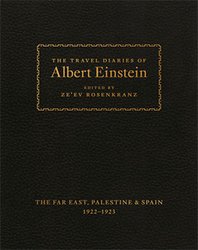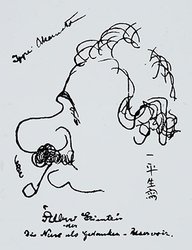June 6th: Princeton University Press Releases Ze'ev Rosenkranz's latest book The Travel Diaries of Albert Einstein: The Far East, Palestine, and Spain, 1922 – 1923
Q&A With The Author:

Q: How does your work as an editor at the Einstein Papers Project compare to, or inform your work as an author?
A: My work as an editor and former curator of the Einstein Archives has given me amazing access to and great familiarity with the materials over many years. As an author, I can express my opinions on the subject matter, whereas as an editor I need to be as objective as possible in selecting, presenting, and annotating the materials.
Q: In a book replete with detail and historical accuracy such as The Travel Diaries of Albert Einstein: The Far East, Palestine, and Spain, 1922-1923, what do you edit out of the book?
A: The major exclusion from the book are the 20 pages of calculations Einstein wrote at the other end of the diary (he turned it upside down and started noting them there). We included those in Vol. 13 of The Collected Papers of Albert Einstein but not in this edition, which is for a popular audience. Similarly, I only included quotes and titles in English in the annotations instead of in the original languages. In addition, this book contains a smaller collection of auxiliary materials (letters, speeches, articles) from the period.

Q: What are the ethics of writing about a historical figure?
A: In previous eras, biographers viewed a historical figure's private life as completely off-limits. I don't subscribe to that point of view. A historical figure's personal life can provide some of the most fascinating insights we can gain about these famous personalities. The intention is not salacious but rather a genuine attempt to understand what makes such celebrities tick. This is particularly pertinent in Einstein's case, where there is such a great discrepancy between the public image and the actual historical individual. Few studies manage to gain a deeper insight into the interrelations between private lives, public personae, political activities, and scientific and intellectual output. Consequently, I don't think there are no-go areas when it comes to the private life of an individual such as Albert Einstein.
Q: Are you planning other books about Einstein or other subjects?
A: I'm currently working on a study of the relationship between Albert Einstein and his second wife Elsa. It will examine topics such as Einstein's masculinity, emotionality, and sexuality through the lens of this crucial relationship; Elsa was also his first and second cousin. It will place the relationship in the context of gender and men's studies, the social history of family and couple relations, and the history of emotions.
Q: Are you trying to build a body of work with connections between each book?
A: I think I have been moving more towards an examination of Einstein's private life with each book. Increasingly, with each publication, I have tried to reach some conclusions about Einstein's personality and how our public image of this celebrity squares up or juxtaposes with the private man.
